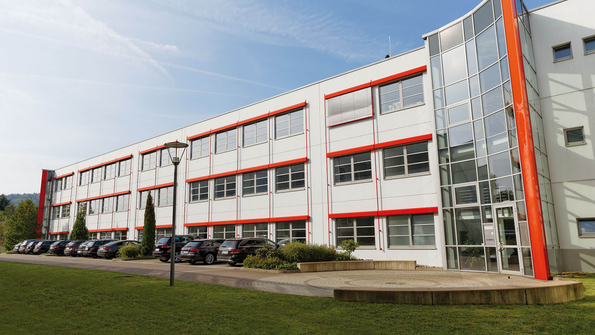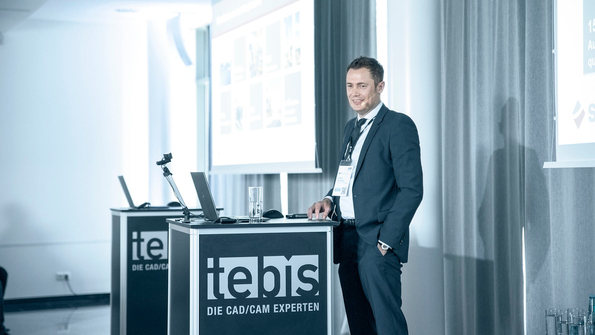Gut feeling meets data
Interview with Diedrich Diedrichsen, Heinz Schwarz GmbH & Co. KG
Interview with Diedrich Diedrichsen, managing partner of Heinz Schwarz GmbH & Co. KG, on successful process changes in the company.
Mr. Diedrichsen, productivity of Heinz Schwarz GmbH & Co. KG has increased enormously since 2016, especially in the small parts process. The expenditure for active surface preparation has decreased significantly, as has that for NC programming. With the reduction in downtime, you produce your parts significantly faster than two years ago. Overall, you've been able to significantly reduce the employee effort in producing your products. You have also started some improvements in large parts manufacturing. So tell us, how did you manage this?
When I took over management at Schwarz in early 2013, the situation was not especially good for the company. This was certainly tied to the after-effects of the 2008 financial crisis. In addition, when evaluating the improvements, it must also be considered what level we started at. Small and large parts manufacturing were definitely taking too long. We had to find out where the problems were in the internal processes, and that is only possible with an in-depth analysis. I like to quote American statistician William Edwards Deming, who was a true pioneer in the quality management field early in the last century: “In God we trust; all others must bring data.“
So you’re not a big fan of gut feeling?
No, actually I am. It is not just pure technical knowledge that makes a good employee; knowing intuitively just what has to be done in a particular situation is critical. This is only possible after many years of experience.
But?
Many gut decisions are good. But it wasn't possible to get a real handle on the problem. There were different department perspectives; everyone had a slightly different opinion about the matter. We were also missing the objective outside perspective. Before any decisions could be made, we had to discuss everything with Tebis and place our observations on a sound basis. Trust your intuition and use it, but check it with rational thinking and logic!
And what was the result?
After the analysis, we had solid numbers on how much time was needed for active surface design, programming, setup and machining as well as for method development, assembly and tryout. We knew exactly where the weak points were.
What measures and consequences did you derive from this?
We set clear goals for each of these areas. For small parts, we wanted to achieve these goals through preparation of the small parts as exact solids, and the introduction of Tebis template technology with the help of Tebis implementation. This would, in particular, enable parallel setup and operation of multiple machines. For large parts, we wanted to design the active surfaces completely with Tebis. Overall, standards and automation became especially important.
Now, truthfully, Mr. Diedrichsen: Is it really that simple? When a traditional company is in the red, a group of investors takes the helm and comprehensive changes are imminent, which creates substantial uncertainty among employees. But don't objective statistics and analyses as well as keywords such as standardization and automation make the employees even more suspicious? Nobody wants to be just a cog in the wheel.
It was difficult, especially in the beginning. Everyone had their own individual work methods, and they managed very well using these in their own areas. Why would they want to change that? But it could be demonstrated very quickly that we can be more productive with more standardization and automation. That's the big disadvantage with gut decisions: They're difficult at best for others to understand. But employees, colleagues and supervisors can only support decisions and help to implement them if they can understand them. That can be achieved with data and analysis. We brought everyone affected in all departments on board and dealt openly and honestly with the challenges. But to be honest, we still continue to have discussions if things don't go as planned. Organizational development is a marathon, not a sprint.
Collaboration across departments is a big problem in many companies.
There can be no progress without mutual understanding. This has proven to be the case especially in the active surface process. After small parts, we also implemented a new active surface process. Active surface design is right at the start of the process chain. Our goal is to include as many product details as possible in the design of the active surface. This means more work for Design in the first step. Of course you have to expect resistance if the designer only sees their own area, but if they realize that it pays for itself in NC programming and especially in tryout and mold manufacturing, they understand the big picture and go along with it. Daily work is simply more pleasant when people communicate better and more frequently.
The major importance of the "soft" factors…
Again, it's all about the employees. Of course there are always individual cases where we have to depart from the standards and react quickly and flexibly. There's no substitute for an employee and his or her experience in this case. I often use the metaphor of a highway here: There are multiple lanes, and it makes sense to use all of them. And if a situation demands something out of the ordinary, we might also have to expand the median, stop traffic in the opposite lane and use an extra lane – but we also need rules and very clear communication to achieve this!
So what's your recipe for success in a nutshell?
First: Be deliberate in including both "young blood" and "old hands" across all department boundaries. Second: Objectively standardize gut feeling with a joint analysis of the current situation. Third: Define goals from the bottom up and agree on these internally as well as externally. Fourth: Ensure uncompromising transparency. Fifth: Implement stringent project management, including evaluation of success. And last but not least: Engage a strong partner with a neutral outside perspective.
So the outside perspective is important?
You need someone who provides unbiased assistance throughout the process and who brings you back down to earth with open and honest criticism if necessary.
And Tebis does that for you?
Software is now a large part of our investment budget and operating costs. All partners in this field are therefore important partners for further development. However, Tebis certainly has the additional advantage that these colleagues know the industry and know what's important in process optimization. This includes consulting, analysis and sound training of employees as well as support in implementing specific software solutions. We have met regularly and jointly reviewed development. Of course, not every function is suitable for each individual application – but we're working on it!
We've often discussed the fact that both hard and soft factors affect each other mutually. So what's your conclusion?
Both data and gut feeling form the basis for successful optimization projects. We view our relationship with Tebis as a long-term partnership for viable increased efficiency of our large and small parts process. You said it yourself at the beginning: We've been able to significantly reduce the employee effort in producing the product and have again become competitive in this area.
Thank you for this conversation, Mr. Diedrichsen
Die Heinz Schwarz GmbH & Co. KG
For more than 50 years, Heinz Schwarz GmbH & Co. KG in Preußisch Oldenburg has been a well-known manufacturer of blanking, progressive, multi-stage and transfer dies for the automotive industry, commercial vehicle manufacturing and agriculture. The product spectrum includes classic die manufacturing as well as complete development, all the way to the series production of parts. With roughly 300 employees, the company ranks among the largest independent die manufacturers in Germany. Diedrich Diedrichsen has been the managing partner of Heinz Schwarz GmbH & Co. KG since 2013.




